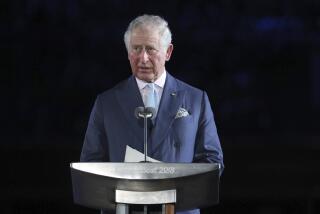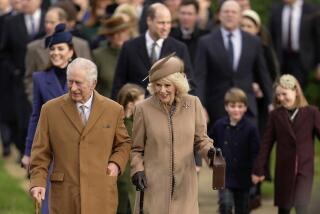Saudi King Suffers Stroke, U.S. Reports : Mideast: Ruler’s hospitalization is likely to spark questions about succession and stability.
- Share via
WASHINGTON — King Fahd of Saudi Arabia, the 72-year-old ruler of the world’s richest oil-producing nation, was taken to a hospital Thursday after suffering a stroke, according to senior U.S. officials.
The king, who is also custodian of the two holiest Islamic shrines for the world’s 1 billion Muslims, has long suffered weight, heart and leg problems as well as diabetes. He underwent gall bladder surgery last year.
The status of King Fahd’s health is almost certain to spark questions about succession and the kingdom’s stability. The next two in line for the Saudi throne--Crown Prince Abdullah and Prince Sultan--are both in their 70s.
Saudi insiders have told U.S. envoys that the king, one of the world’s last absolute monarchs, is expected to recover from the stroke and that he has not suffered permanent impairment--a report so far not independently confirmed.
A senior U.S. official noted: “It’s tough to make a full comeback from a serious stroke, especially in light of his health record.”
Speculation about the king’s health has regularly circulated in international oil circles. His condition is especially important, however, after a bomb blast at U.S. headquarters for a Saudi national guard training program last month shattered the kingdom’s image of tranquillity and order that made it a stark contrast to the endemic violence elsewhere in the region.
*
The Riyadh bombing, which U.S. officials now suspect was the work of new underground dissidents, killed seven, including five Americans, and injured about 60.
“The king’s health is bound to make everyone edgy, in part because of the bomb, which shattered the Saudi sense of serenity. Saudi fiscal health is also still at risk,” a U.S. expert on Saudi Arabia said.
“The Saudis were even warned by the International Monetary Fund that they couldn’t continue the deficit-spending pattern in both the budget and the external balance of payments for the 13th year in a row. They had $155 billion in foreign exchange reserves as of 1981, and now it’s substantially gone.”
The gross domestic product per capita has also been declining for some time as population grows but oil revenues have remained steady or declined.
The official Saudi Press Agency did not mention the king’s illness. It reported only that he was admitted to a Riyadh hospital “to undergo some ordinary medical checkups.” It later added that he was “enjoying health and fitness. May God protect him from all discomfort and keep him in good health.”
But even a news release was unusual for the intensely private royal family. Last week, the agency reported that the king had gone on retreat outside the capital, which triggered an earlier spate of rumors about his possible ill health.
*
U.S. officials said they did not consider Saudi Arabia at any greater risk because of questions about the king’s health.
“Any medical problem is a cause of concern at that age. It points up that the Saudi leadership is aging,” one official said. “But we consider succession in place so in the event that this king or any other Saudi king dies, we know what will follow. We’re confident in the scenario and in the stability that implies.”
King Fahd, a former playboy prince, became the fifth Saudi king after the death of his half-brother, King Khaled, in 1982. He has always been a strong U.S. ally. His government’s purchases have played a strong role in keeping alive U.S. military industries, including production of warplanes, missile-defense systems and tanks.
Saudi succession passes down through the more than 40 sons of Ibn Saud, whose military campaign united many of the Arabian Peninsula’s warring tribes into a single nation in the 1920s and 1930s.
Crown Prince Abdullah, the heir apparent, is head of the national guard. Although he once had a reputation as more Arab-centric and less enthusiastic about close U.S.-Saudi ties, U.S. officials believe relations would not substantially change under his rule.
More to Read
Sign up for Essential California
The most important California stories and recommendations in your inbox every morning.
You may occasionally receive promotional content from the Los Angeles Times.












